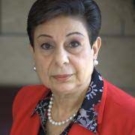Speaker

Hanan Ashrawi
Palestinian leader, legislator, human rights activist, and scholar
Moderator
Event Summary
On June 18, 2019 Arab Center Washington DC (ACW) held an event titled “The Kushner Plan and the Bahrain Economic Workshop: An Official Palestinian Perspective,” at the National Press Club with Dr. Hanan Ashrawi, who is a member of the Palestine Liberation Organization’s (PLO) Executive Committee, a Palestinian legislator, human rights activist, and scholar. Dr. Ashrawi connected with the audience via video conference from her home in Ramallah due to the Trump Administration’s denial of her visa application. ACW Executive Director Khalil E. Jahshan joined Dr. Ashrawi for the discussion and moderated the question and answer session.
Ashrawi recounted the Trump Administration’s decision to deny her visa, saying that she has been visiting the United States since the late 1960’s, studied at the University of Virginia, and has family residing in the country. To be sure, there was no legitimate reason for the administration to reject her application unless, as she suspected, it was to deny her a platform for her outspoken and candid criticism of the administration’s policy towards the Palestinians. Her case, though, is just one of many, she said, and it is indicative of a more fundamental shift in US policy towards Palestine and the Palestinians.
Ashrawi said that this administration has taken the worst policy positions of previous administrations (i.e., bias in favor of Israel and pressure on the Palestinians) but amplified them to their extremes. She enumerated the administration’s unilateral decisions, such as closing the PLO mission in Washington and the US Consulate in Jerusalem, recognizing Jerusalem as Israel’s capital and moving the US embassy there, and defunding projects and cutting assistance that support Palestinians in the occupied territories. She said these moves illustrate how disrupted Palestinian-American relations have become.
Ashrawi said that President Trump’s main advisers on the Israeli-Palestinian conflict—Jared Kushner, Jason Greenblatt, and Ambassador David Friedman—consistently bash the Palestinian leadership while claiming to value and care more about the Palestinian people. Taken together, Ashrwai asserted, the administration’s attitudes towards the Palestinians are like those found in the most fundamentalist elements on the Israeli right. Now, she lamented, the United States has become something of a partner in the Israeli occupation and a spokesperson for Israel.
Commenting on the June 25 – 26 Bahrain Economic Workshop, Ashrawi said that efforts like these have been tried before going back decades. Participants in these workshops search for an “economic peace” to the conflict but ignore the main issues driving it. To her, the upcoming workshop may be appealing to the United States, Israel, and some other Arab leaders, but ultimately, diverting money to the Palestinians does not address the political and legal questions involved. Essentially, the issue most powering the conflict is the occupation, she said, because while Israel has access to copious amounts of funds, anything the occupied territories receives can be destroyed in military operations, land and resources can be confiscated, and Palestinians will still not be able to exercise control over their own lives.
Ashrawi then spent some time reflecting on recent comments made by the Greenblatt-Kushner-Friedman trio. Mr. Greenblatt, she said, is doing a disservice to US diplomacy by conducting tit-for-tat arguments with Palestinian leaders online and over Twitter. Kushner repeated what Ashrawi described as a “prime example of colonial language” when he opined in an interview with Axios that he was unsure whether Palestinians were ready to govern themselves. She tried to remind Mr. Kushner that, despite decades of occupation, Palestinians have survived, built institutions, and worked to address their shortcomings in governing. Ashrawi asked who appointed Mr. Kushner the arbiter of Palestinian rights and self-determination. She said Palestinian rights are inherent and are not for Mr. Kushner to decide.
Regarding Ambassador Friedman’s recent remarks that Israel may “have a right” to annex some of the occupied West Bank, Ashrawi stressed that he was not only reversing decades of US policy but was also circumventing the rule of international law. Ultimately, she said, the administration’s approach to the conflict is disheartening because, while the US is well positioned to play a leading role in solving the conflict, the current actors are sullying US engagement.
Moving forward, Ashrawi said that future administrations must not entrench current policies but rather reverse them. In addition, she suggested the Palestinian leadership would not negotiate with Israel just to negotiate. The balance of power between the two sides is too asymmetrical, so she proposed that an international conference be convened to craft a real, executable plan with concrete steps and a binding timeline for implementation. In her opinion, Mr. Kushner’s so-called “Deal of the Century” and the Bahrain Economic Workshop are not alternatives because they do not address the root cause of the problem: Israel’s occupation of the Palestinian territories.
Event Photos

